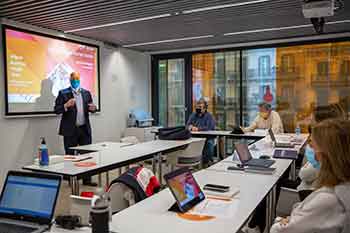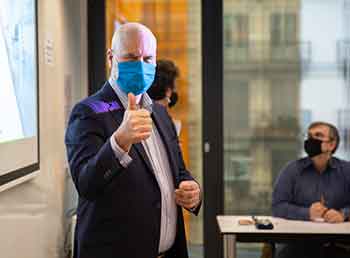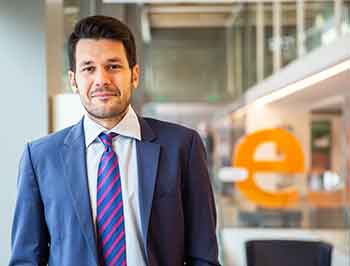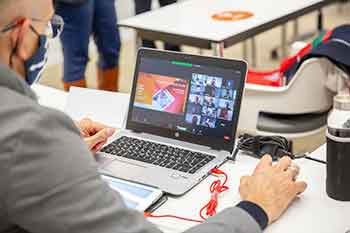25 years of training marketers and leaders in Pharma and Biotech
 EADA’s offer of Pharma and Biotech programmes, which has been in existence for 25 years, coincides with a time of reinvention in the health sector. The Covid-19 pandemic has accelerated the changes that have taken place in the industry in recent years: more innovative business models, creation of new positions and professional roles, new product promotion techniques and a greater segmentation of the business. The Master in Pharmaceutical Marketing, the Market Access programme and the Master in Pharmaceutical & Biotechnology Management at EADA have adapted to the new demands of this ever-changing sector, training more than 700 professionals who currently form part of the major pharmaceutical companies and research centres around the world.
EADA’s offer of Pharma and Biotech programmes, which has been in existence for 25 years, coincides with a time of reinvention in the health sector. The Covid-19 pandemic has accelerated the changes that have taken place in the industry in recent years: more innovative business models, creation of new positions and professional roles, new product promotion techniques and a greater segmentation of the business. The Master in Pharmaceutical Marketing, the Market Access programme and the Master in Pharmaceutical & Biotechnology Management at EADA have adapted to the new demands of this ever-changing sector, training more than 700 professionals who currently form part of the major pharmaceutical companies and research centres around the world.
Three leading programmes in Pharma and Biotech
The longest-running programme is the Master in Pharmaceutical Marketing, taught by 50 active professionals who work in Marketing Management, General Management and Market Access Management. As Programme Director, Juan Carlos Serra explains, “this programme enables participants to develop the key competencies to successfully manage a product in the health sector, from subsidised prescription medicines to consumer healthcare products”. To do this, “the students carry out a marketing plan which they will subsequently have to implement, by analysing all the aspects that may influence the life cycle of a product or service and create value for the potential buyer / prescriber / endorser / user and other stakeholders”.
 For Serra, “the main objective is to train the best marketers so they can take up strategic roles in the most prestigious pharmaceutical companies”. The programme is therefore highly practical, analysing real cases and experiences shared by experts in the field. There is also a focus on leadership skills and the importance of personal branding, a determining factor when leading projects and liaising with different departments and stakeholders”. At the end of the master’s programme, participants also have the opportunity to specialise in Market Access or in the management of consumer healthcare products.
For Serra, “the main objective is to train the best marketers so they can take up strategic roles in the most prestigious pharmaceutical companies”. The programme is therefore highly practical, analysing real cases and experiences shared by experts in the field. There is also a focus on leadership skills and the importance of personal branding, a determining factor when leading projects and liaising with different departments and stakeholders”. At the end of the master’s programme, participants also have the opportunity to specialise in Market Access or in the management of consumer healthcare products.
Juan Carlos Serra is also the Director of the Market Access programme, which was launched 10 years ago when this function in pharmaceutical companies was just beginning to emerge. “Even at the time we realised the key importance that Market Access would have, as a new medicine or healthcare product depends on it to reach the market and to be prescribed by the doctor under the best conditions”. He adds that, “The function of Market Access has gained importance over the last few years since regional healthcare systems need to balance access to innovation with their budgets”. The programme therefore focuses on understanding the role of managers and finding out the different measures of rational use of a medicine from the expertise of professionals in the Market Access field, consultants and profiles working in Public Administration.
 These two programmes are joined by a third, the International Master in Pharmaceutical & Biotech Management, which focuses on developing the necessary competencies to take on a management position in the Pharma and Biotech industry. According to Programme Director, Anton Giulio Manganelli, “it is a master’s degree designed for profiles with a scientific background who want to improve their leadership skills as well as for those who have already acquired these skills but who want to broaden their knowledge regarding the latest trends in the sector”. Apart from the five specialisations that participants can choose at the end of the programme (pharma, biotech, medical devices, digital health and consumer healthcare), they benefit from an international experience in multicultural classes with profiles from different backgrounds. They analyse real cases with experts from the industry and visit renowned laboratories and research centres in Barcelona.
These two programmes are joined by a third, the International Master in Pharmaceutical & Biotech Management, which focuses on developing the necessary competencies to take on a management position in the Pharma and Biotech industry. According to Programme Director, Anton Giulio Manganelli, “it is a master’s degree designed for profiles with a scientific background who want to improve their leadership skills as well as for those who have already acquired these skills but who want to broaden their knowledge regarding the latest trends in the sector”. Apart from the five specialisations that participants can choose at the end of the programme (pharma, biotech, medical devices, digital health and consumer healthcare), they benefit from an international experience in multicultural classes with profiles from different backgrounds. They analyse real cases with experts from the industry and visit renowned laboratories and research centres in Barcelona.
Programmes in constant change
The Pharma and Biotech programmes at EADA are continually adapting to the changes taking place in the sector. Manganelli refers to those related to the fourth industrial revolution which include the introduction of new technologies, automation and the digitalisation of processes, but also to those changes which are intrinsic to the industry such as reinventing business models or launching new products. For example, the growing importance of aspects relating to digital health, medical devices, consumer health and biotechnology.
Juan Carlos Serra also points to the regulation of the sector, which demands that professionals continually improve their leadership skills and update their knowledge. “They are very transversal and strategic profiles within the company, who must possess a great deal of knowledge about the product and be up-to-date about the regulatory framework, as well as demonstrate negotiation and communication skills to be able to liaise with the different stakeholders”.
Catalonia, healthcare hub
 The participants who take part in these programmes give very positive feedback about doing their training in Catalonia, which is a hub for life sciences and healthcare in the south of Europe. It boasts more than 1,200 companies which include biotech companies, pharmaceuticals, medtech and suppliers. The region has 89 research centres for life sciences and similar fields such as nanotechnology, bioinformatics, genetics/genomics or therapeutic areas for cancer and neurodegenerative diseases. It also has 18 university hospitals and 9 hospital research centres, 14 science and technology parks (including Eurecat) and scientific facilities such as Alba Synchrotron, MareNostrum Supercomputer and the Centre for Genomic Regulation. According to Manganelli, “we are talking about more than 5,000 professionals employed in scientific research and 11,000 employees working in the research centres”.
The participants who take part in these programmes give very positive feedback about doing their training in Catalonia, which is a hub for life sciences and healthcare in the south of Europe. It boasts more than 1,200 companies which include biotech companies, pharmaceuticals, medtech and suppliers. The region has 89 research centres for life sciences and similar fields such as nanotechnology, bioinformatics, genetics/genomics or therapeutic areas for cancer and neurodegenerative diseases. It also has 18 university hospitals and 9 hospital research centres, 14 science and technology parks (including Eurecat) and scientific facilities such as Alba Synchrotron, MareNostrum Supercomputer and the Centre for Genomic Regulation. According to Manganelli, “we are talking about more than 5,000 professionals employed in scientific research and 11,000 employees working in the research centres”.
According to various reports, there are already more than 60 international investment groups who are active in healthcare companies in Barcelona. The majority of capital is invested in biotechnology projects, medical devices and general health. Barcelona has become the focus for the majority of national laboratories such as Grifols, Almirall, Esteve and Ferrer. It is also the central headquarters for European companies such as Sanofi, Boehringer Ingelheim and Novartis among others. As Serra says, “It is an honour for us to see that many of the marketers who work for these companies are also members of EADA’s Alumni Community and they come to class to share their experiences with the current participants”.
